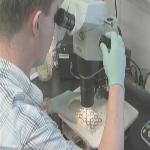August 22, 2011

Scientists have identified antibodies that might be effective against a broad range of HIV mutations, and which could lead to an effective HIV vaccine.
The search for a vaccine against HIV/AIDS has been disappointing, in part because the virus cleverly changes to elude the antibodies of the human immune system. Now, scientists have identified antibodies that may be effective against a broad range of HIV mutations.
Vaccines work by stimulating the body's own immune system to mount a defense against disease. But the human immune system just isn't very good at fighting off an HIV infection, in part because the virus is constantly mutating. That's been a big obstacle to developing an HIV vaccine, as Laura M. Walker of the Scripps Research Institute in California says.
"For HIV, current vaccines, because of the variability of the virus, don't induce antibodies that are able to recognize many different virus strains. And therefore, they usually are not very effective in preventing infection or preventing disease."
But Walker and her colleagues identified rare antibodies that were effective against a large number of the virus variations in circulation.
In the lab, they mixed those antibodies with HIV and saw that the virus was neutralized, and a relatively small amount of antibodies did the trick.
"What's special about these antibodies is that they're able to inactivate the viruses at very low concentrations, which means that if you could induce these antibodies by a vaccine, you wouldn't need very much of them to provide some protection, which we think is very hopeful in terms of vaccine design," Walker says.
The researchers isolated specific molecules from the antibodies that attacked new targets in the virus. Walker says these molecules might be used as what she calls templates for potential vaccines.
"Then, hopefully you can develop vaccine candidates that can induce these types of antibodies in a large population of people."
Walker is cautiously optimistic that her work may lead to an effective HIV vaccine. However, she says her approach may help protect people who are newly exposed to HIV, but probably won't benefit those who already carry the virus.